春节中英文简介
SpringFestival春节的英文简介5篇

SpringFestival春节的英文简介5篇Spring Festival, also known as Chinese New Year, is the most important traditional festival in China. It is a time when families gather together to celebrate the beginning of a new year and to pay respect to ancestors. In this article, we will provide a concise introduction to Spring Festival in English.1. Origin and SignificanceThe origins of the Spring Festival can be traced back over 4,000 years ago to the Shang Dynasty. It marks the end of winter and the beginning of spring, symbolizing a new cycle of life and the hope for a prosperous year ahead. The festival holds great significance for Chinese people as it represents a time for reunion and renewal.2. Festive PreparationsPreparations for the Spring Festival start well in advance. People thoroughly clean their homes and decorate them with red couplets, lanterns, and paper cuttings, all of which are believed to bring good luck. Chinese families also stock up on food, especially traditional dishes, such as dumplings and fish, which have auspicious meanings associated with them.3. Reunion DinnerThe most important event during the Spring Festival is the reunion dinner, also known as "Nian Ye Fan." It is held on New Year's Eve when family members come together to enjoy a lavish feast. The dinner usually consists of various dishes, including fish, dumplings, chicken, and numerousother delicacies. The reunion dinner is a time for family bonding and creating precious memories.4. Fireworks and Lion DanceFireworks and the lion dance are essential parts of Spring Festival celebrations. At midnight on New Year's Eve, communities light up the sky with dazzling fireworks. The loud sounds and bright colors are believed to scare away evil spirits and bring good luck for the upcoming year. The lion dance, performed by skilled dancers, represents a mythical beast bringing joy and fortune to the community.5. Red Envelopes and Lantern FestivalDuring the Spring Festival, it is customary to give and receive red envelopes, known as "hongbao." Usually, married members of the family give red envelopes containing money to unmarried children and younger relatives as a symbol of good luck and blessings. The Lantern Festival, which marks the end of the Spring Festival, takes place on the 15th day of the lunar year. People light and release lanterns into the night sky, signifying the end of the festive period.In summary, Spring Festival is a time of celebration and tradition in China. It is a time for family togetherness, joyful festivities, and the exchange of good wishes. From the festive preparations to the reunion dinner, and from the vibrant fireworks to the red envelopes, every aspect of the festival holds deep cultural significance. The Spring Festival encapsulates the essence of Chinese culture and is a treasured occasion for millions of people around the world.。
如何用英文单词介绍春节
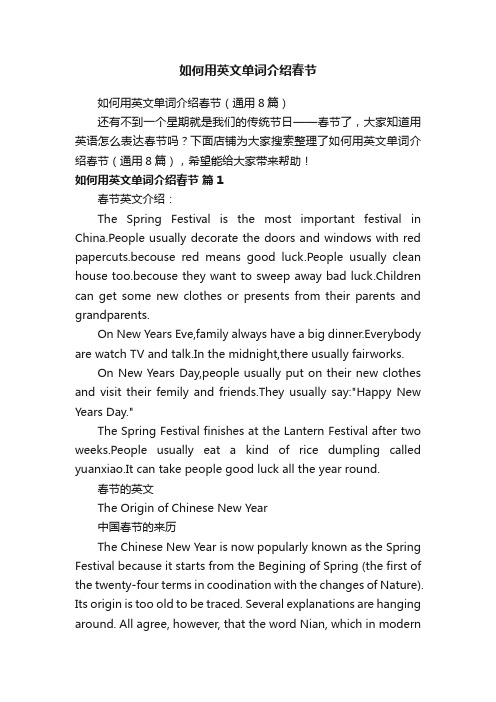
如何用英文单词介绍春节如何用英文单词介绍春节(通用8篇)还有不到一个星期就是我们的传统节日——春节了,大家知道用英语怎么表达春节吗?下面店铺为大家搜索整理了如何用英文单词介绍春节(通用8篇),希望能给大家带来帮助!如何用英文单词介绍春节篇1春节英文介绍:The Spring Festival is the most important festival in China.People usually decorate the doors and windows with red papercuts.becouse red means good luck.People usually clean house too.becouse they want to sweep away bad luck.Children can get some new clothes or presents from their parents and grandparents.On New Years Eve,family always have a big dinner.Everybody are watch TV and talk.In the midnight,there usually fairworks.On New Years Day,people usually put on their new clothes and visit their femily and friends.They usually say:"Happy New Years Day."The Spring Festival finishes at the Lantern Festival after two weeks.People usually eat a kind of rice dumpling called yuanxiao.It can take people good luck all the year round.春节的英文The Origin of Chinese New Year中国春节的来历The Chinese New Year is now popularly known as the Spring Festival because it starts from the Begining of Spring (the first of the twenty-four terms in coodination with the changes of Nature). Its origin is too old to be traced. Several explanations are hanging around. All agree, however, that the word Nian, which in modernChinese solely means "year", was originally the name of a monster beast that started to prey on people the night before the beginning of a new year.One legend goes that the beast Nian had a very big mouth that would swallow a great many people with one bite. People were very scared. One day, an old man came to their rescue, offering to subdue Nian. T o Nian he said, "I hear say that you are very capable, but can you swallow the other beasts of prey on earth instead of people who are by no means of your worthy opponents?" So, it did swallow many of the beasts of prey on earth that also harrassed people and their domestic animals from time to time.After that, the old man disappeared riding the beast Nian. He turned out to be an immortal god. Now that Nian is gone and other beasts of prey are also scared into forests, people begin to enjoy their peaceful life. Before the old man left, he had told people to put up red paper decorations on their windows and doors at each years end to scare away Nian in case it sneaked back again, because red is the color the beast feared the most.From then on, the tradition of observing the conquest of Nian is carried on from generation to generation. The term "Guo Nian", which may mean "Survive the Nian" becomes today "Celebrate the (New) Year" as the word "guo" in Chinese having both the meaning of "pass-over" and "observe". The custom of putting up red paper and firing fire-crackers to scare away Nian should it have a chance to run loose is still around. However, people today have long forgotten why they are doing all this, except that they feel the color and the sound add to the excitement of the celebration.春节常用英文过年 Guo-nian; have the Spring Festival对联 poetic couplet: two successive rhyming lines in poetry 春联 Spring Festival couplets剪纸 paper-cuts年画 New Year paintings买年货 special purchases for the Spring Festival ; do Spring Festival shopping敬酒 propose a toast灯笼 lantern: a portable light灯会 exhibit of lanterns守岁 staying-up拜年 pay New Years call; give New Years greetings; New Years visit禁忌 taboo去晦气 get rid of the ill- fortune祭祖宗 offer sacrifices to ones ancestors压岁钱 gift money; money given to children as a lunar New Year gift辞旧岁 bid farewell to the old year扫房 spring cleaning; general house-cleaning八宝饭 eight treasures rice pudding糖果盘 candy tray什锦糖 assorted candies - sweet and fortune蜜冬瓜 candied winter melon - growth and good health西瓜子 red melon seed - joy, happiness, truth and sincerity 金桔 cumquat - prosperity糖莲子 candied lotus seed - many descendents to come糖藕 candied lotus root - fulfilling love relationship红枣 red dates - prosperity花生糖 peanut candy - sweet春节的英文祝福语--给父母亲Mom and Dad: Thank you for everything this holiday season!爸爸妈妈:值此佳节,感谢您们所给予的一切。
中国传统节日(中英文对照)
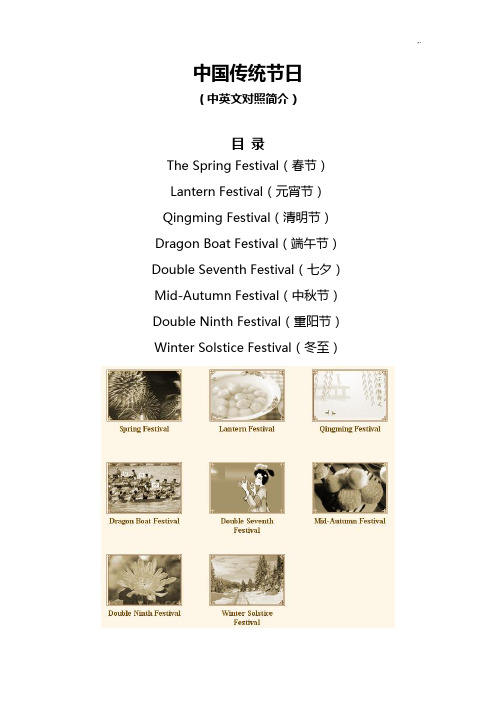
中国传统节日(中英文对照简介)目录The Spring Festival(春节)Lantern Festival(元宵节)Qingming Festival(清明节)Dragon Boat Festival(端午节)Double Seventh Festival(七夕)Mid-Autumn Festival(中秋节)Double Ninth Festival(重阳节)Winter Solstice Festival(冬至)The Spring Festival(春节)The first day of the first lunar month is the New Year in the Chinese lunar calendar. Among the traditional Chinese festivals, this is the most important and the most bustling. Since it occurs at the end of winter and the beginning of spring, people also call it the Spring Festival.Chinese have many traditional customs relating to the Spring Festival. Since the 23rd day of the 12th lunar montha, people start to prepare for the event. Every family will undertake thorough cleaning, do their Spring Festival shopping, create paper-cuts for window decoration, put up New Year picturesb, write Spring Festival coupletsc, make New Year cakesd, and also prepare all kinds of food to bid farewell to the old and usher in the new.New Year's Eve is the time for a happy reunion of all family members, when they sit around the table to have a sumptuous New Year's Eve dinner, talking and laughing, until daybreak, which is called "staying up to see the year out". When the bell tolls midnight on New Year's Eve, people eat dumplings. In ancient times, midnight was called zishi (a period of the day from 11 p.m. to 1 a.m.). Dumplings (jiaozi) are eaten because it sounds the same as "change of the year and the day" in Chinese.From the first day of the lunar year, people pay New Year calls on relatives and friends, which is an important custom for the Spring Festival.Setting off firecrackers is the favorite activity of children in the Spring Festival. According to legend, this could drive off evil spirits. The continuous sound of firecrackers can be heard everywhere, adding to the atmosphere of rejoicing and festivity.Many places hold temple fairs. The wonderful dragon lantern dance and the lion dance performances, along with various handicraft articles and local snacks attract thousands of people.With the development of the times, some changes have taken place inthe customs of spending the Spring Festival. For example, to prevent environmental pollution, many cities have banned firecrackers. But this does not have an impact on the happy atmosphere of the festival. On New Year's Eve, family members get together to have dinner while watching TV programs.For Chinese at home and abroad, the Spring Festival is always the most important festival.农历的正(zheng)月初一,是中国的农历新年。
用英语介绍春节带翻译
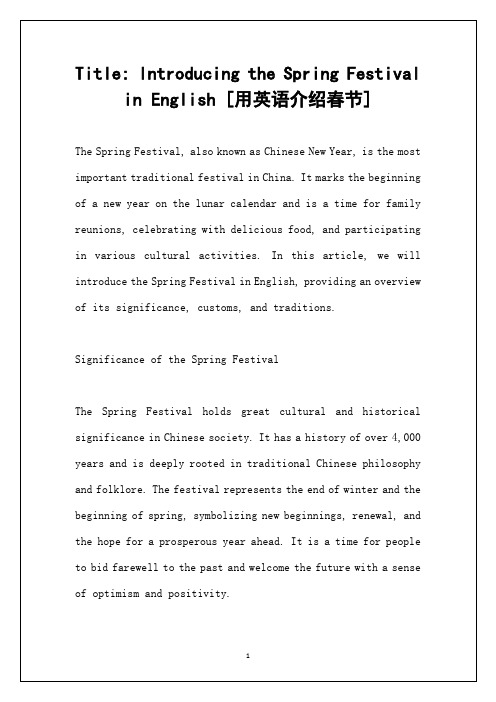
The Spring Festival is a time-honored tradition that brings together families and communities to celebrate the arrival of the new year. It represents the rich cultural heritage of China and has become a global celebration that unites people of diverse backgrounds in the spirit of joy and renewal. By introducing the Spring Festival in English, we hope to promote cross-cultural understanding and appreciation for this special time of year. So, what are you waiting for? Join in the celebrations and experience the warmth and hospitality of the Spring Festival for yourself! Happy Chinese New Year!祝你新年快乐!
Celebrations Across China
The Spring Festival is celebrated with unique customs and traditions in different regions of China. For example, in northern China, it is common to eat jiaozi (dumplings) during the festival, while in southern China, there is a tradition of enjoying niangao (glutinous rice cake). In Shanghai, people gather to light traditional lanterns along the famous waterfront area known as the Bund. In Beijing, a grand temple fair is held at Ditan Park, attracting visitors from all over the country.
春节中英文介绍
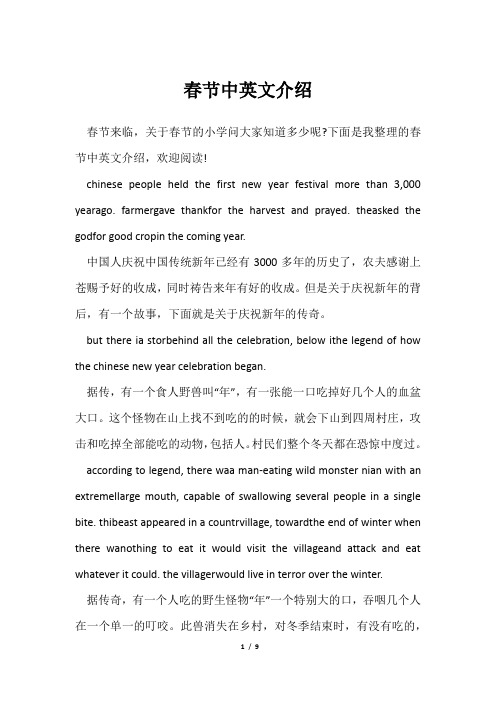
春节中英文介绍春节来临,关于春节的小学问大家知道多少呢?下面是我整理的春节中英文介绍,欢迎阅读!chinese people held the first new year festival more than 3,000 yearago. farmergave thankfor the harvest and prayed. theasked the godfor good cropin the coming year.中国人庆祝中国传统新年已经有3000多年的历史了,农夫感谢上苍赐予好的收成,同时祷告来年有好的收成。
但是关于庆祝新年的背后,有一个故事,下面就是关于庆祝新年的传奇。
but there ia storbehind all the celebration, below ithe legend of how the chinese new year celebration began.据传,有一个食人野兽叫“年”,有一张能一口吃掉好几个人的血盆大口。
这个怪物在山上找不到吃的的时候,就会下山到四周村庄,攻击和吃掉全部能吃的动物,包括人。
村民们整个冬天都在恐惊中度过。
according to legend, there waa man-eating wild monster nian with an extremellarge mouth, capable of swallowing several people in a single bite. thibeast appeared in a countrvillage, towardthe end of winter when there wanothing to eat it would visit the villageand attack and eat whatever it could. the villagerwould live in terror over the winter.据传奇,有一个人吃的野生怪物“年”一个特别大的口,吞咽几个人在一个单一的叮咬。
英文版春节介绍
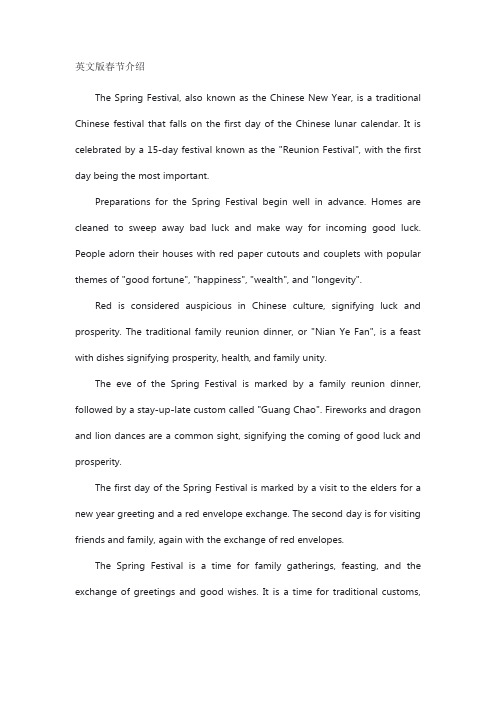
英文版春节介绍The Spring Festival, also known as the Chinese New Year, is a traditional Chinese festival that falls on the first day of the Chinese lunar calendar. It is celebrated by a 15-day festival known as the "Reunion Festival", with the first day being the most important.Preparations for the Spring Festival begin well in advance. Homes are cleaned to sweep away bad luck and make way for incoming good luck. People adorn their houses with red paper cutouts and couplets with popular themes of "good fortune", "happiness", "wealth", and "longevity".Red is considered auspicious in Chinese culture, signifying luck and prosperity. The traditional family reunion dinner, or "Nian Ye Fan", is a feast with dishes signifying prosperity, health, and family unity.The eve of the Spring Festival is marked by a family reunion dinner, followed by a stay-up-late custom called "Guang Chao". Fireworks and dragon and lion dances are a common sight, signifying the coming of good luck and prosperity.The first day of the Spring Festival is marked by a visit to the elders for a new year greeting and a red envelope exchange. The second day is for visiting friends and family, again with the exchange of red envelopes.The Spring Festival is a time for family gatherings, feasting, and the exchange of greetings and good wishes. It is a time for traditional customs,dragon and lion dances, fireworks, and a general atmosphere of joy and celebration.【中文对照】春节,也被称为中国新年,是中国的传统节日,在中国农历的第一天。
春节的中英文介绍
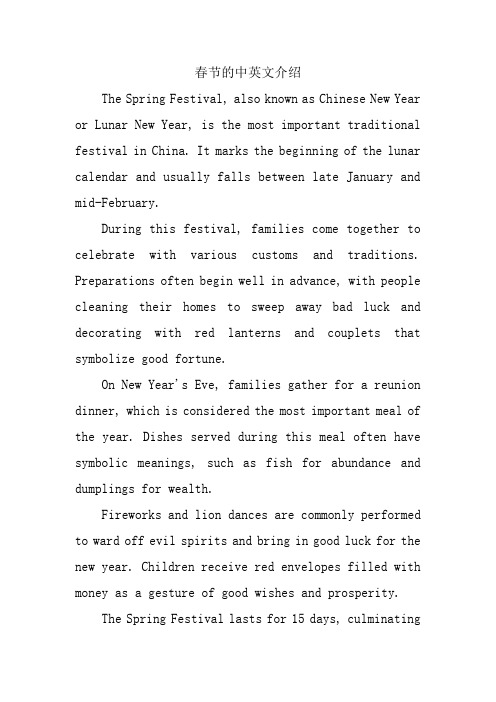
春节的中英文介绍The Spring Festival, also known as Chinese New Year or Lunar New Year, is the most important traditional festival in China. It marks the beginning of the lunar calendar and usually falls between late January and mid-February.During this festival, families come together to celebrate with various customs and traditions. Preparations often begin well in advance, with people cleaning their homes to sweep away bad luck and decorating with red lanterns and couplets that symbolize good fortune.On New Year's Eve, families gather for a reunion dinner, which is considered the most important meal of the year. Dishes served during this meal often have symbolic meanings, such as fish for abundance and dumplings for wealth.Fireworks and lion dances are commonly performed to ward off evil spirits and bring in good luck for the new year. Children receive red envelopes filled with money as a gesture of good wishes and prosperity.The Spring Festival lasts for 15 days, culminatingin the Lantern Festival, where people light lanterns and enjoy various festive activities.中文翻译:春节,也被称为中国新年或农历新年,是中国最重要的传统节日。
关于春节的简介英文

关于春节的简介英文春节,是农历正月初一,又叫阴历年,俗称“过年”。
这是我国民间最隆重、最热闹的一个传统节日。
那么关于春节的简介英文是怎么写的呢?下面由店铺为你提供的关于春节的简介英文,希望能帮到你。
关于春节的简介英文(一)Spring Festival is the most important festival in China .It’s to celebrate the lunar calendar ‘s new year .In the evening before the Spring Festival ,families get together and have a big meal .In many places people like to set off firecrackers .Dumplings are the most traditional food .Children like the festival very much ,because they can have delicious food and wear new clothes .They can also get some money from their parents. This money is given to children for good luck . People put New Year scrolls on the wall for good fortune .The Spring Festival lasts about 15 days long .People visit relatives and friends with the words “Have all your wishes ”. People enjoy the Spring Festival ,during this time they can have a good rest .关于春节的简介英文(二)Spring FestivalThe Spring Festival is the most important festival for the Chinese people and is when all family members get together, just like Christmas in the West. All people living away from home go back, becoming the busiest time for transportation systems of about half a month from the Spring Festival. Airports, railway stations and long-distance bus stations are crowded with home returnees.The Spring Festival falls on the 1st day of the 1st lunar month, often one month later than the Gregorian calendar. It originatedin the Shang Dynasty (c. 1600 BC-c. 1100 BC) from the people's sacrifice to gods and ancestors at the end of an old year and the beginning of a new one.Strictly speaking, the Spring Festival starts every year in the early days of the 12th lunar month and will last till the mid 1st lunar month of the next year. Of them, the most important days are Spring Festival Eve and the first three days. The Chinese government now stipulates people have seven days off for the Chinese Lunar New Year.Many customs accompany the Spring Festival. Some are still followed today, but others have weakened.On the 8th day of the 12th lunar month, many families make laba porridge, a delicious kind of porridge made with glutinous rice, millet, seeds of Job's tears, jujube berries, lotus seeds, beans, longan and gingko.The 23rd day of the 12th lunar month is called Preliminary Eve. At this time, people offer sacrifice to the kitchen god. Now however, most families make delicious food to enjoy themselves.After the Preliminary Eve, people begin preparing for the coming New Year. This is called "Seeing the New Year in".Store owners are busy then as everybody goes out to purchase necessities for the New Year. Materials not only include edible oil, rice, flour, chicken, duck, fish and meat, but also fruit, candies and kinds of nuts. What's more, various decorations, new clothes and shoes for the children as well as gifts for the elderly, friends and relatives, are all on the list of purchasing.Before the New Year comes, the people completely clean the indoors and outdoors of their homes as well as their clothes, bedclothes and all their utensils.Then people begin decorating their clean rooms featuring anatmosphere of rejoicing and festivity. All the door panels will be pasted with Spring Festival couplets, highlighting Chinese calligraphy with black characters on red paper. The content varies from house owners' wishes for a bright future to good luck for the New Year. Also, pictures of the god of doors and wealth will be posted on front doors to ward off evil spirits and welcome peace and abundance.The Chinese character "fu" (meaning blessing or happiness) is a must. The character put on paper can be pasted normally or upside down, for in Chinese the "reversed fu" is homophonic with "fu comes", both being pronounced as "fudaole." What's more, two big red lanterns can be raised on both sides of the front door. Red paper-cuttings can be seen on window glass and brightly colored New Year paintings with auspicious meanings may be put on the wall.People attach great importance to Spring Festival Eve. At that time, all family members eat dinner together. The meal is more luxurious than usual. Dishes such as chicken, fish and bean curd cannot be excluded, for in Chinese, their pronunciations, respectively "ji", "yu" and "doufu," mean auspiciousness, abundance and richness. After the dinner, the whole family will sit together, chatting and watching TV. In recent years, the Spring Festival party broadcast on China Central Television Station (CCTV) is essential entertainment for the Chinese both at home and abroad. According to custom, each family will stay up to see the New Year in.Waking up on New Year, everybody dresses up. First they extend greetings to their parents. Then each child will get money as a New Year gift, wrapped up in red paper. People in northern China will eat jiaozi, or dumplings, for breakfast, as they think"jiaozi" in sound means "bidding farewell to the old and ushering in the new". Also, the shape of the dumpling is like gold ingot from ancient China. So people eat them and wish for money and treasure.Southern Chinese eat niangao (New Year cake made of glutinous rice flour) on this occasion, because as a homophone, niangao means "higher and higher, one year after another." The first five days after the Spring Festival are a good time for relatives, friends, and classmates as well as colleagues to exchange greetings, gifts and chat leisurely.Burning fireworks was once the most typical custom on the Spring Festival. People thought the spluttering sound could help drive away evil spirits. However, such an activity was completely or partially forbidden in big cities once the government took security, noise and pollution factors into consideration. As a replacement, some buy tapes with firecracker sounds to listen to, some break little balloons to get the sound too, while others buy firecracker handicrafts to hang in the living room.The lively atmosphere not only fills every household, but permeates to streets and lanes. A series of activities such as lion dancing, dragon lantern dancing, lantern festivals and temple fairs will be held for days. The Spring Festival then comes to an end when the Lantern Festival is finished.China has 56 ethnic groups. Minorities celebrate their Spring Festival almost the same day as the Han people, and they have different customs.关于春节的英文资料1.I like the Chinese new year better than any other festival. This is a time especially for rest and joy. I need not study. I wear good clothes and eat good food. I have a good time frommorning till night. I am as happy as a king.我喜欢中国新年比喜欢其它任何节日更甚。
中国传统节日(中英文对照)

中国传统节日(中英文对照简介)目录The Spring Festival(春节)Lantern Festival(元宵节)Qingming Festival(清明节)Dragon Boat Festival(端午节)Double Seventh Festival(七夕)Mid-Autumn Festival(中秋节)Double Ninth Festival(重阳节)Winter Solstice Festival(冬至)The Spring Festival(春节)The first day of the first lunar month is the New Year in the Chinese lunar calendar. Among the traditional Chinese festivals, this is the most important and the most bustling. Since it occurs at the end of winter and the beginning of spring, people also call it the Spring Festival.Chinese have many traditional customs relating to the Spring Festival. Since the 23rd day of the 12th lunar montha, people start to prepare for the event. Every family will undertake thorough cleaning, do their Spring Festival shopping, create paper-cuts for window decoration, put up New Year picturesb, write Spring Festival coupletsc, make New Year cakesd, and also prepare all kinds of food to bid farewell to the old and usher in the new.New Year's Eve is the time for a happy reunion of all family members, when they sit around the table to have a sumptuous New Year's Eve dinner, talking and laughing, until daybreak, which is called "staying up to see the year out". When the bell tolls midnight on New Year's Eve, people eat dumplings. In ancient times, midnight was called zishi (a period of the day from 11 p.m. to 1 a.m.). Dumplings (jiaozi) are eaten because it sounds the same as "change of the year and the day" in Chinese.From the first day of the lunar year, people pay New Year calls on relatives and friends, which is an important custom for the Spring Festival.Setting off firecrackers is the favorite activity of children in the Spring Festival. According to legend, this could drive off evil spirits. The continuous sound of firecrackers can be heard everywhere, adding to the atmosphere of rejoicing and festivity.Many places hold temple fairs. The wonderful dragon lantern dance and the lion dance performances, along with various handicraft articles and local snacks attract thousands of people.With the development of the times, some changes have taken place in the customs of spending the Spring Festival. For example, to prevent environmental pollution, many cities have banned firecrackers. But this does not have an impact on the happy atmosphere of the festival. On New Year's Eve, family members get together to have dinner while watching TV programs.For Chinese at home and abroad, the Spring Festival is always the most important festival.农历的正(zheng)月初一,是中国的农历新年。
英文春节资料带翻译
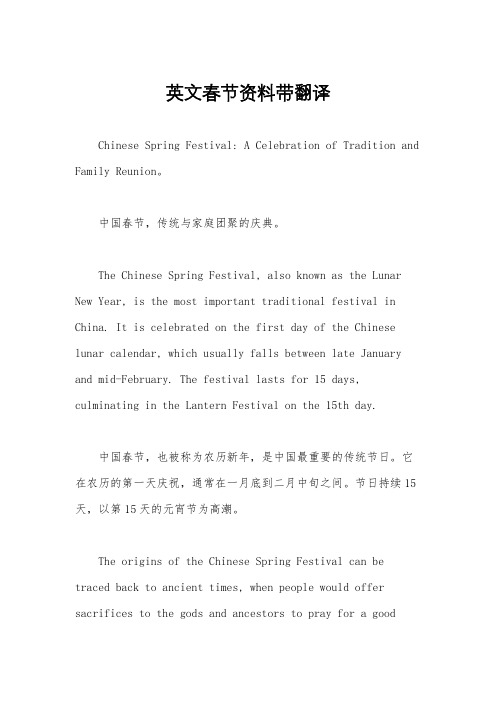
英文春节资料带翻译Chinese Spring Festival: A Celebration of Tradition and Family Reunion。
中国春节,传统与家庭团聚的庆典。
The Chinese Spring Festival, also known as the Lunar New Year, is the most important traditional festival in China. It is celebrated on the first day of the Chinese lunar calendar, which usually falls between late January and mid-February. The festival lasts for 15 days, culminating in the Lantern Festival on the 15th day.中国春节,也被称为农历新年,是中国最重要的传统节日。
它在农历的第一天庆祝,通常在一月底到二月中旬之间。
节日持续15天,以第15天的元宵节为高潮。
The origins of the Chinese Spring Festival can be traced back to ancient times, when people would offer sacrifices to the gods and ancestors to pray for a goodharvest and prosperity in the coming year. Later, it became a time for family reunion, when people would travel long distances to return to their hometowns and spend time with their loved ones.中国春节的起源可以追溯到古代,当时人们会向神灵和祖先祭祀,祈求来年的丰收和繁荣。
The Spring Festival春节介绍(中英文版)
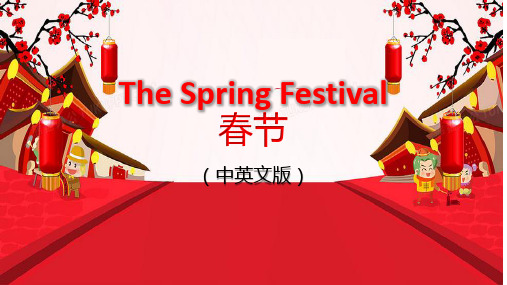
Custom
除夕之夜,全家团聚在一起 吃年夜饭,万家灯火通明,围坐 炉旁闲聊,通宵守夜,象征着团 圆,期待着新的一年吉祥如意。
On New Year's Eve, the whole family gathers together to have a New Year's Eve dinner, with all the lights on. They sit around the fireplace chatting and stay up all night, symbolizing reunion and looking forward to a prosperous new year.
The Spring Festival 春节
(中英文版)
目录
1
Origin
2
Time
3
Significance
4
Custom
春节即中国农历新年,俗称新春、新岁、岁旦等。
The Spring Festival is the Chinese Lunar New Year, commonly known as the new year, the new year, the new year's day and so on.
Origin
据记载,中国人过春节已有4 千多年的历史,它是由虞舜兴起的。
According to records, the Chinese people have celebrated the Spring Festival for more than 4000 years. It was raised by Yu Shun.
Significance
春节是我国民族的传统节日,是 中华民族文化的绘萃。
关于春节的介绍英文版(四句话)
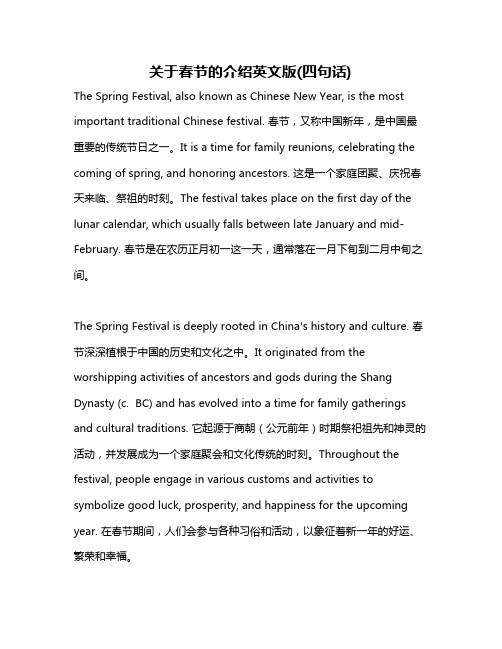
关于春节的介绍英文版(四句话)The Spring Festival, also known as Chinese New Year, is the most important traditional Chinese festival. 春节,又称中国新年,是中国最重要的传统节日之一。
It is a time for family reunions, celebrating the coming of spring, and honoring ancestors. 这是一个家庭团聚、庆祝春天来临、祭祖的时刻。
The festival takes place on the first day of the lunar calendar, which usually falls between late January and mid-February. 春节是在农历正月初一这一天,通常落在一月下旬到二月中旬之间。
The Spring Festival is deeply rooted in China's history and culture. 春节深深植根于中国的历史和文化之中。
It originated from the worshipping activities of ancestors and gods during the Shang Dynasty (c. BC) and has evolved into a time for family gatherings and cultural traditions. 它起源于商朝(公元前年)时期祭祀祖先和神灵的活动,并发展成为一个家庭聚会和文化传统的时刻。
Throughout the festival, people engage in various customs and activities to symbolize good luck, prosperity, and happiness for the upcoming year. 在春节期间,人们会参与各种习俗和活动,以象征着新一年的好运、繁荣和幸福。
介绍春节英语作文带翻译(精选25篇)
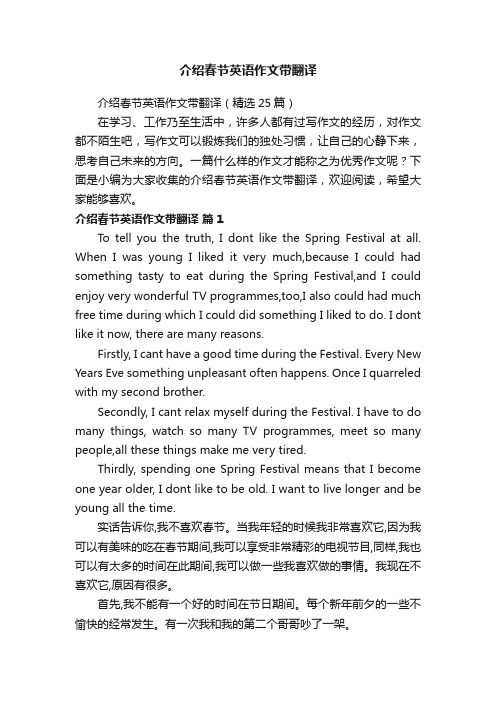
介绍春节英语作文带翻译介绍春节英语作文带翻译(精选25篇)在学习、工作乃至生活中,许多人都有过写作文的经历,对作文都不陌生吧,写作文可以锻炼我们的独处习惯,让自己的心静下来,思考自己未来的方向。
一篇什么样的作文才能称之为优秀作文呢?下面是小编为大家收集的介绍春节英语作文带翻译,欢迎阅读,希望大家能够喜欢。
介绍春节英语作文带翻译篇1To tell you the truth, I dont like the Spring Festival at all. When I was young I liked it very much,because I could had something tasty to eat during the Spring Festival,and I could enjoy very wonderful TV programmes,too,I also could had much free time during which I could did something I liked to do. I dont like it now, there are many reasons.Firstly, I cant have a good time during the Festival. Every New Years Eve something unpleasant often happens. Once I quarreled with my second brother.Secondly, I cant relax myself during the Festival. I have to do many things, watch so many TV programmes, meet so many people,all these things make me very tired.Thirdly, spending one Spring Festival means that I become one year older, I dont like to be old. I want to live longer and be young all the time.实话告诉你,我不喜欢春节。
介绍春节中英文素材
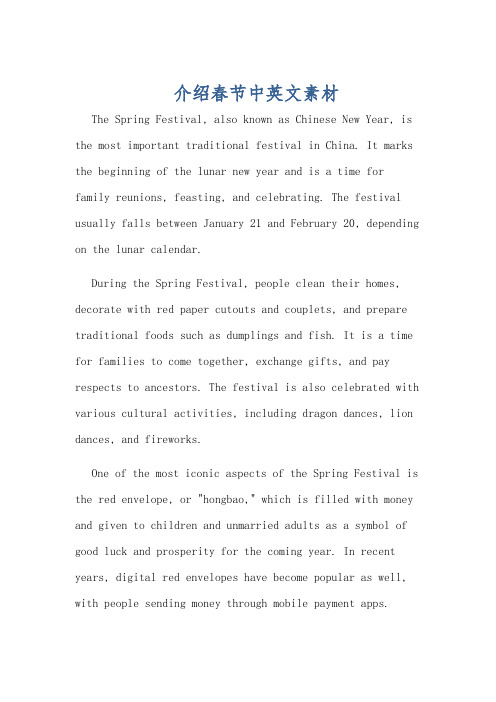
介绍春节中英文素材The Spring Festival, also known as Chinese New Year, is the most important traditional festival in China. It marks the beginning of the lunar new year and is a time for family reunions, feasting, and celebrating. The festival usually falls between January 21 and February 20, depending on the lunar calendar.During the Spring Festival, people clean their homes, decorate with red paper cutouts and couplets, and prepare traditional foods such as dumplings and fish. It is a time for families to come together, exchange gifts, and pay respects to ancestors. The festival is also celebrated with various cultural activities, including dragon dances, lion dances, and fireworks.One of the most iconic aspects of the Spring Festival is the red envelope, or "hongbao," which is filled with money and given to children and unmarried adults as a symbol of good luck and prosperity for the coming year. In recent years, digital red envelopes have become popular as well, with people sending money through mobile payment apps.In addition to traditional customs, the Spring Festival is also a time for people to make resolutions for the new year, such as improving their health, finding a job, or starting a new hobby. It is a time for reflection and renewal.The Spring Festival is a time for joy and celebration, but it is also a time to honor tradition and show respect for one's heritage. It is a time to appreciate the past and look forward to the future.春节,又称为中国新年,是中国最重要的传统节日。
春节的由来英文介绍带翻译

春节的由来英文介绍带翻译春节的由来英文介绍带翻译有哪些?春节挂贴年画在城乡也很普遍,浓黑重彩的年画给千家万户平添了很多兴隆快乐的喜庆气氛。
一起来看看春节的由来英文介绍带翻译,欢送查阅!书目春节的来源英文介绍介绍中国传统春节年俗的英语春节习俗英文简介春节的来源英文介绍Spring Festival is the most important holiday for Chinese people. Excitement and happiness are palpable this time of the year,and they reach the peak on lunar new year‘s eve.春节对于中国人来说是最重要的节日。
在每年的春节都让人兴致勃勃,尤其是大年三十那晚,更是到达了高潮。
Though the 15-day period,which starts with the first day of the lunar new year and ends on the 15th day (known as Lantern Festival),is relatively long,it is the busiest time of the year for Chinese people. The arrangements they have to make for family reunions,buying necessities and preparing food keeps them busy throughout the holiday. Many of them travel back home and meet friends over dinner and drinks. Thecelebrations include decorating the house and setting off fireworks.春节历时15天,也就从大年初一起先,到元月十五元宵节完毕。
教你如何用英语介绍春节~

【导语】春节要到了,来提前渲染⼀下⽓氛吧!除⼣、拜年、春联、春晚、庙会、压岁钱、中国结…年味⼗⾜的春节英⽂⼩知识,给外国朋友介绍中国传统⽂化时⽤得上!欢迎阅读参考!更多相关讯息请关注⽆忧考!春节的英语介绍 春节,也被称为农历新年。
对于中国⼈来说,这是规模,最重要的传统节⽇。
就如同西⽅的圣诞节⼀样,春节是⼀家团聚的⽇⼦。
The Spring Festival is also called Chinese Lunar New Year. Being one of the traditional Chinese festivals, it is the grandest and most important festival for Chinese people. It is also the time for whole families to get together, which is similar to Christmas for Westerners. 春节从农历新年第⼀天开始,⼏乎要持续半个⽉。
但在民间传统中,这⼀节⽇从腊⽉23⽇就开始了,⼀直到正⽉⼗五(元宵节)。
It comes on the first day of Chinese lunar calendar and lasts for almost half of a month. But in folk custom, this traditional holiday lasts from the 23rd day of the twelfth month to the 15th day of the first month (The Lantern Festival) on the lunar calendar.春节习俗如何⽤英语介绍? ⼤年三⼗:团圆饭 就除⼣夜⽽⾔,⽆论⾝在何处,也不管路途多么遥远,⼈们都会设法赶回家,所以除⼣夜的盛⼤晚餐也叫做“团圆饭”。
SpringFestival春节的英文简介5篇

SpringFestival春节的英文简介5篇第一篇:Spring Festival 春节的英文简介Spring FestivalThe Spring Festival is also called Chinese New Year.It is the most important holiday in China.It is usually comes in January or February.Strictly speaking, the Spring Festival starts every year in the early days of the 12th lunar month and will last till the mid 1st lunar month of the next year.Of them, the most important days are Spring Festival Eve and the first three days.Before the New Year comes, the people completely clean the indoors and outdoors of their homes as well as their clothes, bedclothes and all their utensils.Then people begin decorating their clean rooms featuring anatmosphere of rejoicing and festivity.All the door panels will be pasted with Spring Festival couplets, highlighting Chinese calligraphy with black characters on red paper.The content varies from house owners' wishes for a bright future to good luck for the New Year.Also, pictures of the god of doors and wealth will be posted on front doors to ward off evil spirits and welcome peace and abundance.The Chinese character “fu”(meaning blessing or happiness)is a must.The character put on paper can be pasted normally or upside down, for in Chinese the “reversed fu” is homophonic with “fu comes”, both being pronounced as “fudaole.” What's more, two big red lanterns can be raised on both sides of the front door.Red paper-cuttings can be seen on window glass and brightly colored New Year paintings with auspicious meanings may be put on the wall.People attach great importance to Spring Festival Eve.At that time, all family members eat dinner together.The meal is more luxurious thanusual.Dishes such as chicken, fish and bean curd cannot be excluded, for in Chinese, their pronunciations, respectively “ji”, “yu” and “doufu,” mean auspiciousness, abundance and richness.After the dinner, the whole family will sit together, chatting and watching TV.In recent years, the Spring Festival party broadcast on China Central Television Station(CCTV)is essential entertainment for the Chinese both at home and abroad.According to custom, each family will stay up to see the New Year in.Waking up on New Year, everybody dresses up.First they extend greetings to their parents.Then each child will get money as a New Year gift, wrapped up in red paper.Burning fireworks was once the most typical custom on the Spring Festival.People thought the spluttering sound could help drive away evil spirits.The lively atmosphere not only fills every household, but permeates to streets and lanes.A series of activities such as lion dancing, dragon lantern dancing, lantern festivals and temple fairs will be held for days.The Spring Festival then comes to an end when the Lantern Festival is finished.2BJane第二篇:SpringFestivalOn the eighth day the Fujian people have another family reunion dinner, and at midnight they pray to Tian Gong, the God of Heaven.The ninth day is to make offerings to the Jade Emperor.The 10th through the 12th are days that friends and relatives should be invited for dinner.After so much rich food, on the 13th day you should have simple rice congee and mustard greens(choi sum)to cleanse the system.The 14th day should be for preparations to celebrate the Lantern Festival which is to be held on the 15th night.第三篇:描写春节的英语作文SpringFestival写写帮文秘助手()之描写春节的英语作文:Spring Festivalspring festival is the most important festival in china.it‘s to celebrate the lunar calendar ’s new year.in the evening before the spring festival,families get together and have a big meal.in many places people like to set off firecrackers.dumplings are the most traditional food.children like the festival very much,because they can have delicious food and wear new clothes.they can also get some money from their parents.this money is given to children for good luck.people put new year scrolls on the wall for good fortune.the spring festival lasts about 15 days long.people visit relatives and friends with the words “have all your wishes ”。
春节的介绍中英结合
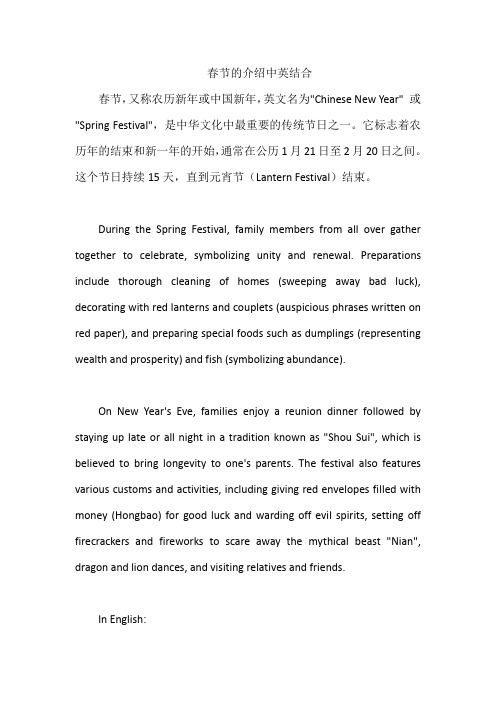
春节的介绍中英结合春节,又称农历新年或中国新年,英文名为"Chinese New Year" 或"Spring Festival",是中华文化中最重要的传统节日之一。
它标志着农历年的结束和新一年的开始,通常在公历1月21日至2月20日之间。
这个节日持续15天,直到元宵节(Lantern Festival)结束。
During the Spring Festival, family members from all over gather together to celebrate, symbolizing unity and renewal. Preparations include thorough cleaning of homes (sweeping away bad luck), decorating with red lanterns and couplets (auspicious phrases written on red paper), and preparing special foods such as dumplings (representing wealth and prosperity) and fish (symbolizing abundance).On New Year's Eve, families enjoy a reunion dinner followed by staying up late or all night in a tradition known as "Shou Sui", which is believed to bring longevity to one's parents. The festival also features various customs and activities, including giving red envelopes filled with money (Hongbao) for good luck and warding off evil spirits, setting off firecrackers and fireworks to scare away the mythical beast "Nian", dragon and lion dances, and visiting relatives and friends.In English:The Chinese New Year, steeped in rich cultural heritage, encapsulates the essence of family unity and renewal. It is a time when people across China clean their homes, adorn them with auspicious symbols, feast on symbolic foods, exchange red envelopes for luck, and engage in lively celebrations like dragon and lion dances. The loud bangs of firecrackers punctuate the air to fend off misfortune and usher in a year of prosperity and happiness.Internationally, the Chinese New Year has become a vibrant showcase of Chinese culture, celebrated not only within China but also across the globe where Chinese communities exist. It is a period marked by joyous festivities, traditional rituals, and a shared hope for a bright and successful new year.。
- 1、下载文档前请自行甄别文档内容的完整性,平台不提供额外的编辑、内容补充、找答案等附加服务。
- 2、"仅部分预览"的文档,不可在线预览部分如存在完整性等问题,可反馈申请退款(可完整预览的文档不适用该条件!)。
- 3、如文档侵犯您的权益,请联系客服反馈,我们会尽快为您处理(人工客服工作时间:9:00-18:30)。
春节是中国传统的新年,它从中国农历正月的第一天开始到第十五天结束,一共十五天。
春节也预示着春天的来临。
在新年的前一段时间,人们开始准备食物、买新衣服和打扫房间。
很多家庭会在门上贴上春联。
按照习俗,所有的准备是希望新的一年会带来幸福和好运。
在中国,红色是好运的象征。
Spring Festival is the Chinese New Year. It starts on the 1st and ends on the 15th of lunar January. Spring Festival celebrates the coming of spring. Several days before the New Year, every family prepares rich food, buys new clothes, and cleans the house. Many families buy or write Spring Festival couplets and put them on the door. People believe that everything must be new and clean for the Spring Festival celebration so that the New Year will bring happiness and good luck. In China, red represents luck.
在除夕夜,人们通常要到十二点以后才睡觉,这叫“守岁”,“岁”也是“年”的意思,通常人们用岁表示年龄,即一年是一岁。
守岁是送走旧的一年迎来新的一年,所以在晚上12点时,很多家庭都会放鞭炮以示新的一年的到来。
新年的第一天,也就是初一,人们基本上都呆在家里。
从年初二开始,人们起的很早,互相拜年并致以新年的祝福等。
On New Year’s eve, people set off fireworks from around midnight to see out the end of the previous year and welcome in the New Year, called “shǒusuì” .“suì”means year. On the first day of the New Year people usually stay at home. On the 2nd day people get up early and exchange New Year’s greetings with relatives, friends, neighbors, etc.
传统就是,从新年第一天开始直到正月十五,每天都要吃不同的主菜。
从饺子、面条、春卷、年糕到汤圆。
除了祭好五脏庙以外,每一种食物也有含义:比如饺子看起来就像金元宝,这意味来年的丰衣足食。
The tradition is to have different main courses everyday from the 1st day of the New Year to t he 15th day of the New Year, from Jiao Zi (du mplings), noodles, spring rolls, sticky rice cak es, and Tang Yuan (stuffed rice balls). Besides culinary satisfaction, each food has a meaning as well: for instance, Jiao Zi looks like gold, i mplying a wealthy year ahead.
中文中“过年”这个词组用以表示对春节(中国新年)的庆祝。
“年”这个字在中文里是一种恐怖的怪兽。
因为“年”害怕红色和火,所以中国人会在门上悬挂“春联”写上美好祝福,并放鞭炮来赶跑它。
这个传统有点类似西方人用大蒜和十字架吓跑吸血鬼的传统。
The term "pass year" is used for the Spring Festival (Chinese New Year). The word "Year" in Chinese characters used to mean a horrible beast. To combat the beast, the Chinese hang "good luck" wishes on red paper on the door and use fireworks in the belief that the beast fears red and fire. This tradition in many ways resemble the Western belief of using garlic and crosses to fight vampires.
Pasting paper cuts and "up sided fu" 贴窗花和倒着的“福”字
通常带有吉祥图案的窗花传递节日喜庆和热闹的气氛和表达中国人期待幸福生活的美好愿望。
除了贴窗花,在墙上,门上和房子周围的门框上贴大小福字是中国人表达对美好生活渴望的普遍习俗。
Paper-cuts, usually with auspicious patterns, give a happy and prosperous atmosphere of the Festival and express the good wishes of Chinese people looking forward to a good life. In addition to pasting paper-cuts on windows。
春节是中国最最重要的节日.春节前一天的晚上,一家人都聚在一起吃晚饭.许多人都喜欢(在这时候)放炮竹.饺子是传统的食物. 小孩子非常喜欢这个节日,因为他们能吃到很多美味的食物,穿漂亮的衣服.他们还能收到父母给的压岁钱.这些钱能给孩子带来好运.人民也会把新年的画挂在墙上,为了来年的好运.
Spring Festival is the most important festival i n China .In the evening before the Spring Festi val ,families get together and have a big meal . In many places people like to set off firecracke rs .Dumplings are the most traditional food .C hildren like the festival very much ,because th ey can have delicious food and wear new cloth es .They can also get some money from their p arents. This money is given to children for goo d luck . People put New Year scrolls on the wa ll for good fortune .。
